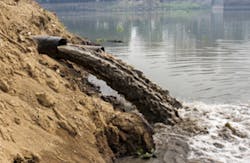The U.S. Environmental Protection Agency and the Department of Justice said Chesapeake Appalachia, LLC, a subsidiary of Chesapeake Energy, the nation’s second largest natural gas producer, will spend an estimated $6.5 million to restore 27 sites damaged by unauthorized discharges of fill material into streams and wetlands. Under terms of the pernalty, the company will also be required to implement a comprehensive plan to comply with federal and state water protection laws at the company’s natural gas extraction sites in West Virginia.
The company will also pay a civil penalty of $3.2 million, one of the largest ever levied by the federal government for violations of the Clean Water Act (CWA), under the Section 404 program, which requires a federal permit prior to the discharge of dredge or fill material materials into wetlands, rivers, streams, and other waters of the U.S.
READ ALSO: EPA Launches Web Tool for Chemical Safety & Regulatory Information
The federal government and the West Virginia Department of Environmental Protection (WVDEP) allege that the company impounded streams and discharged sand, dirt, rocks and other fill material into streams and wetlands without a federal permit in order to construct well pads, impoundments, road crossings and other facilities related to natural gas extraction. The alleged violations being resolved by today’s settlement occurred at 27 sites located in the West Virginia Counties of Boone, Kanawha, Lewis, Marshall, Mingo, Preston, Upshur and Wetzel, including 16 sites involving hydraulic fracturing operations. The government alleges that the violations impacted over 12,000 linear feet of stream, or approximately 2.2 miles, and more than three acres of wetlands.
The settlement requires that the company fully restore the wetlands and streams wherever feasible, monitor the restored sites for up to 10 years to assure the success of the restoration, and implement a comprehensive compliance program to ensure future compliance with the CWA and applicable state law. The company will also perform compensatory mitigation, which will likely involve purchasing credits from a wetland mitigation bank located in a local watershed.
EPA discovered some of the violations through information provided by the public and routine inspections. In addition, the company voluntarily disclosed potential violations at 19 of the sites following an internal audit. In 2010 and 2011, EPA issued administrative compliance orders for violations at 11 sites. Since that time, the company has been correcting the violations and restoring those sites, in compliance with EPA’s orders.
The settlement also resolves alleged violations of state law brought by WVDEP. The state of West Virginia is a co-plaintiff in the settlement and will receive half of the civil penalty.
In a related case in December 2012, the company pled guilty to three violations of the CWA related to natural gas extraction activity in Wetzel County, at one of the sites subject to today’s settlement. The company was sentenced to pay a $600,000 penalty to the federal government for discharging crushed stone and gravel into Blake Fork, a local stream, to create a roadway to improve access to a drilling site. The company has already fully restored the damage done to the site.
Chesapeake Appalachia engages in the exploration and production of natural gas in the Appalachian Basin. The company has oil and natural gas properties in West Virginia, Pennsylvania, and Ohio.
The consent decree, lodged today in the Northern District of West Virginia, is subject to a 30-day public comment period and court approval. The consent decree is available for review at www.justice.gov/enrd/Consent_Decrees.html. For more information about the settlement, go here.


